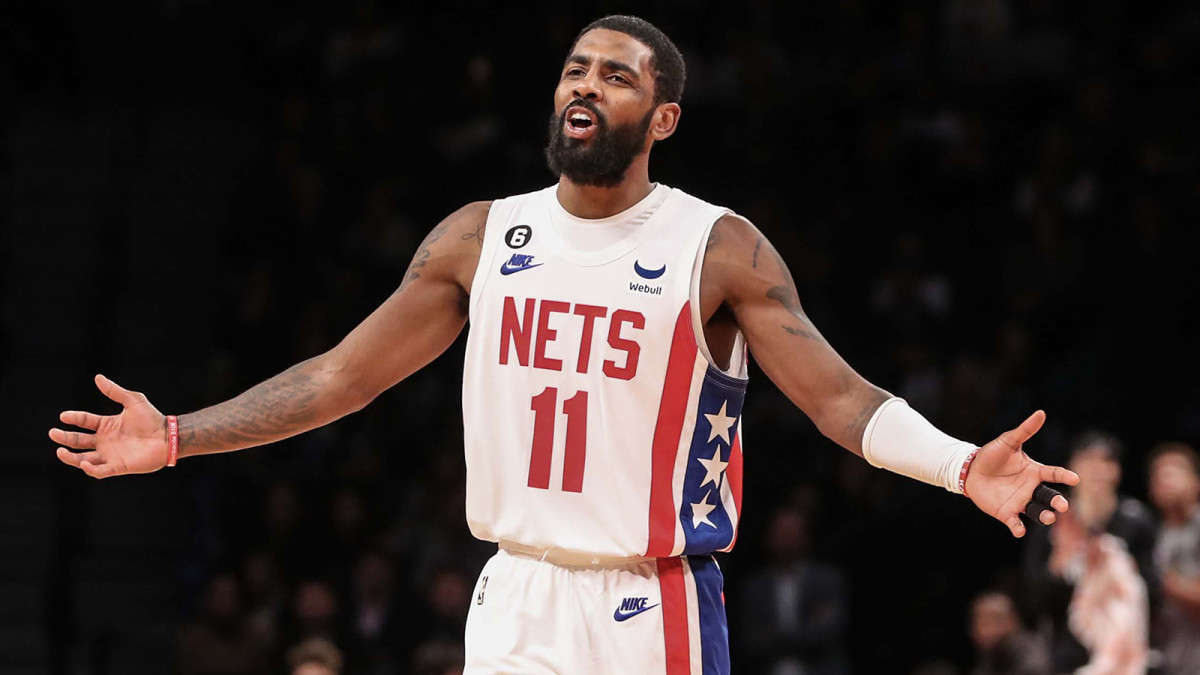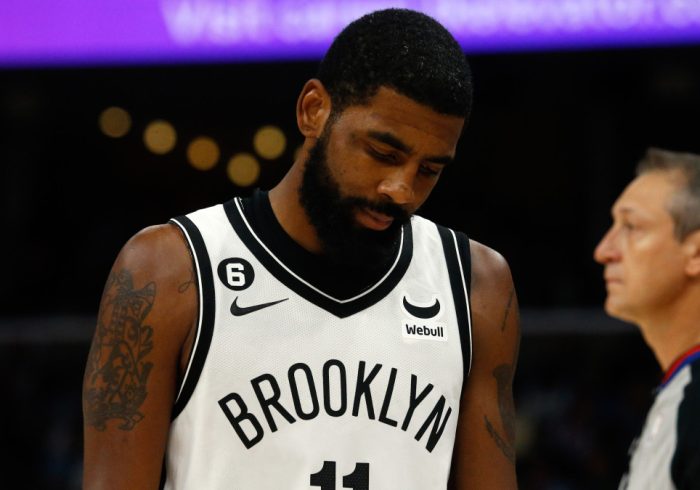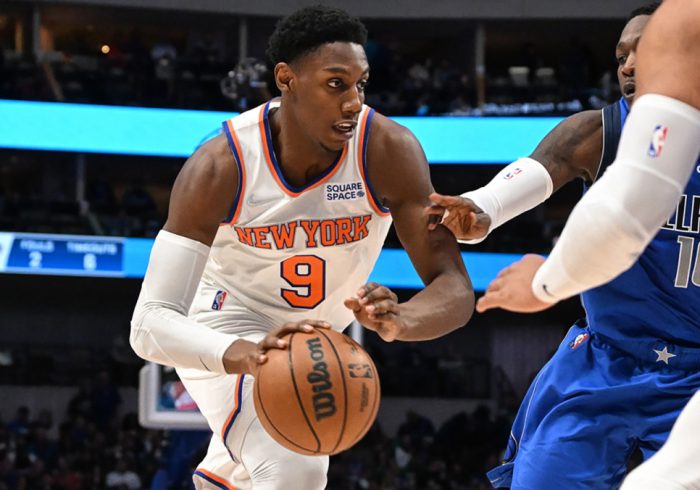There was a time, early in his career, when the worst you could say about Kyrie Irving was that he seemed selfish—a spectacular scorer who couldn’t make his team better.
There was a time when the worst you could say about Kyrie Irving was that he seemed foolish—for forcing a trade that separated him from the greatest player of his era, and from a team he’d helped win a championship just a year earlier.
There was a time when the worst you could say about Kyrie Irving was that he seemed careless—for gleefully suggesting Earth was flat (a stance he’d later disavow and apologize for).
There was a time when the worst you could say about Kyrie Irving was that he seemed reckless—for refusing the coronavirus vaccine, making himself ineligible for half a season, sabotaging his team’s title hopes (all while minimizing a public health crisis).
Across a decorated career packed with thrills—including one of the greatest shots in Finals history—Kyrie Irving has by turns been inspiring and infuriating, mesmerizing and utterly exasperating, forever dancing on the edge of societal norms and rationality, with just inches to spare before plunging into the abyss.
There was a time when you could dismiss Kyrie Irving as immature or misguided or mischievous or simply misinformed. But now?
Now the worst you could say is that Kyrie Irving deliberately promoted an antisemitic film, repeatedly defended that choice, steadfastly refused to apologize and dismissed anyone who raised concerns—including his team, the NBA and the Anti-Defamation League.
And based on all that, you could justifiably say much worse about him—and it would be hard to refute any of it.
The film Irving tweeted about last week (which we won’t name here) leaves no ambiguity about its own viewpoint, trafficking in countless antisemitic tropes (per Rolling Stone): that Jews control the media and banking, that Jews were responsible for slavery, that Jews created anti-Black racism and on and on, drawing on fabricated quotes that have been a staple of antisemitic propaganda for decades.
The film (according to a screenshot posted by the New York Post’s Mike Vaccaro) also accuses Jews of creating “falsehoods” to “protect their status and power.” Among these alleged falsehoods? That six million Jews were killed in the Holocaust.
There is nothing veiled or vague here. This is classic, blatant antisemitic propaganda, the same vile, hateful talking points spewed by neo-Nazis, alt-right trolls and conspiracy theorists of all stripes.
Kyrie Irving posted a link to this film, with these assertions, left it up for days, dismissed all criticism, made himself out to be the victim, lashed out at reporters who asked him to explain himself and cut short his media session Saturday night. But he did first confirm that yes, in fact, he’d watched the film before tweeting the link—eliminating the possibility he’d perhaps promoted the film without knowing its contents—which means he’s also forfeited any benefit of the doubt.
Kyrie Irving did not retract his promotion of an antisemitic film and book on social media.
Wendell Cruz/USA TODAY Sports
On Twitter last week, Irving declared himself an omnist (a person who believes in all religions) and insisted that any accusations of antisemitism were “not justified” nor reflective of “the reality or truth I live in.” In his brief press conference Saturday, Irving said he embraced “all walks of life” and talked “to all races, all cultures, all religions.”
That might all be true. But you cannot reconcile Kyrie’s “we are the world” happy talk with the tacit endorsement of a film that accuses Jews of Satan worship and calls the Holocaust a hoax. Again, he says he watched the film. He listened to these talking points. And still he offered a broad defense of the film’s agenda when he said, “History is not supposed to be hidden from anybody.”
While doubling down on the film, Irving also defended posting an old video of right-wing extremist and conspiracy-monger Alex Jones, ranting about “corrupt empires, secret societies and oligarchies” and the “New World Order”—a phrase frequently entwined with antisemitic tropes. And though he distanced himself from Jones’s most outrageous claim—that the Sandy Hook massacre was a hoax—Irving said of the old video clip, “It’s true.”
By the time Irving took the podium Saturday, Nets owner Joe Tsai had issued a rare public statement via Twitter, expressing his dismay. And the NBA, without naming Irving, had issued its own broad reprimand, stating, “Hate speech of any kind is unacceptable,” that antisemitic messages should be “challenged and refuted,” and that the league would “continue working with all members of the NBA community to ensure that everyone understands the impact of their words and actions.”
None of it mattered to Irving, who opted for combativeness over contrition, defiance instead of humility, self-importance over self-reflection. He tried to cast himself as a victim and a martyr, and not for the first time.
Sometime on Sunday, Irving deleted the post about the film—without explanation and without any indication of remorse or regret. By then, he’d received an enthusiastic endorsement from none other than Ye (formerly known as Kanye West), who has spent the last several weeks spewing bigotry and antisemitic tropes while also claiming victimhood. “There’s some real ones still here,” Ye wrote on Instagram, under a photo of Irving.
In recent days, bigots around the country have been amplifying the ugliness, proclaiming “Kanye is right” (on banners hanging from a Los Angeles overpass) and “Kanye is right about the Jews” (via projected displays around Jacksonville). Whether Irving intends to or not, he is giving aid and comfort to the worst among us—and, disturbingly, doesn’t seem to grasp that.
Basketball is the least concerning of all the issues here, but this is a Nets problem, too, because once again Irving has drawn attention away from the court and away from the mission, to satisfy his own quixotic agenda, at a time they can least afford the distraction. The Nets fell to 1–5 just before Irving took the podium Saturday, looking dispirited, disjointed and ripe for a teardown.
Kevin Durant, remember, demanded a trade over the summer. Irving, remember, failed to get the extension he sought and is on a one-year deal. Steve Nash, in his second season as a head coach, continues to look overmatched in the role. Ben Simmons, in his first games after missing a full season, looks tentative and overwhelmed. The slightest bump in the road could send the Nets careening into a ditch.
And yet there was Irving, determined to prove once again what an independent thinker is, promoting bizarre conspiracy theories and antisemitic tropes to his 4.6 million Twitter followers and his 17.5 million followers on Instagram.
But this stuff isn’t cute or harmless. This isn’t “just asking questions” or “doing my own research” or a matter of “personal choice.” This is passive endorsement of hate speech and bigotry, at a time when hate crimes and violence are rising, thanks to a surge of online disinformation and the bloviating of right-wing provocateurs.
This wasn’t just another flight of fancy. With his latest intellectual detour, Kyrie Irving has lost any benefit of the doubt. But let’s be clear on this much: COVID-19 is real, vaccines work, the Earth is round, and the Holocaust happened.
Refusal to accept these things doesn’t make Kyrie Irving brave or independent or a free thinker. It makes him Alex Jones with a jump shot.
More NBA Coverage:



